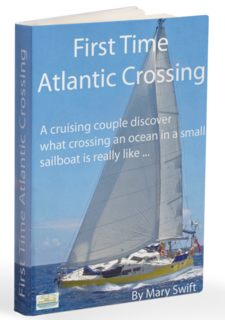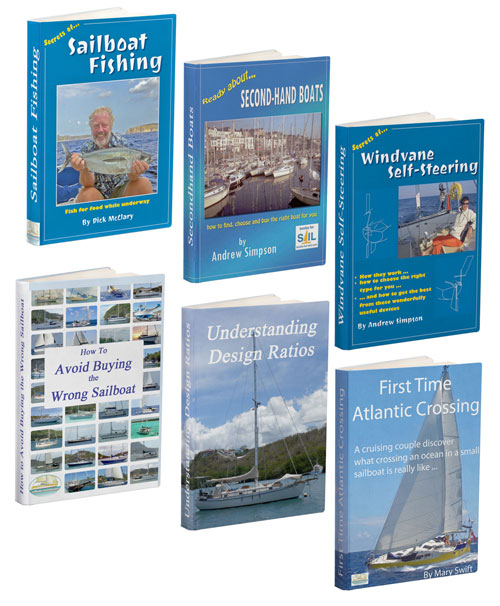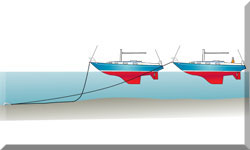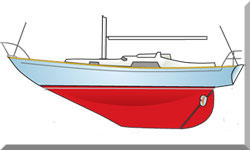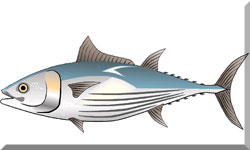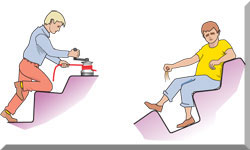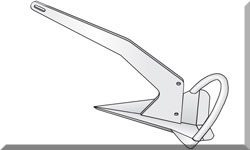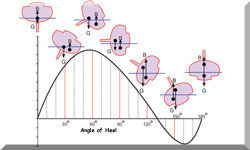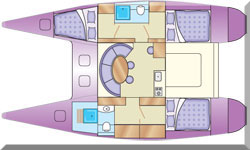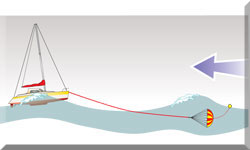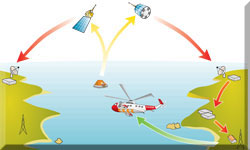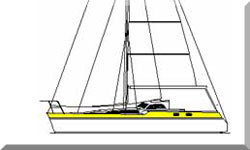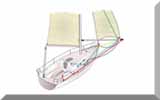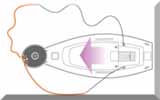- Home
- Mary's Journal
- At Anchor
At Anchor and Ashore in
La Coruña
from 'The Journal of Alacazam', by Mary Swift...
After a four day crossing of the Bay of Biscay we decide to spend a few days at anchor and ashore in La Coruña, a harbour on the north coast of Atlantic Spain.
In fact, we don't have to anchor as we've found a vacant visitor's mooring.
Better still, it has a pick-up line so we don't need to use the fancy line--reeving boat hook that has so far caused more problems that it's solved.
Dick hears his name being called from the direction of the pontoon. He cannot recognize the lady who is shouting "Dick, we are just around the corner!"
Sleep is forgotten and as soon as we are ready (complete with bathing gear for a much needed shower) we row the dinghy to the pontoon and find Kuramu and Eric and Jan. Jan's had her hair cut really short hence the non-recognition.
They've been in La Coruña for a few days. They'd left Falmouth the day before us to sail directly to Gibraltar, but Biscay had been flat calm and they'd motored most of the way until the alternator on their engine stopped working. After being becalmed for ages they eventually made it into La Coruña and had been keeping a look-out for us.
We row ashore and make our way to the Real Nautico Club where Dick finds a television set and - surprise, surprise - he is just in time to watch the start of the German Formula 1 Grand Prix, a passion of his. We enjoy a cold beer and tapas and I leave Dick watching the TV and go to find the shower room.
This yacht club is reputed to be very up-market but I find it really shabby. There are no seats on the toilets and although the shower works it is nothing special. Nevertheless I enjoy my shower and when dry, cover myself with a sun-cream lotion that includes insect repellent because I have discovered two more insect bites, one on each temple.
I return to the bar to find Dick sitting completely upright in his seat, fast asleep. A classic example of static equilibrium, one nudge and Newton's second law of motion would take immediate effect. Resisting the temptation, I gently wake him and he cannot believe that he has missed most of the Grand Prix. He decides to take a shower and leaves me to watch the finishing laps and to see Ralph Schumacher winning the Grand Prix (Michael Schumacher, Hakkinen and Coulthard having all retired).
There is a three-day yacht-racing event currently taking place in La Coruña and the participants have been guaranteed mooring places. Jan has come to find us to tell us that they have been told to move to another smaller marina nearer the centre of town and are not quite sure where it is, but insists we must be sure to find them.
We row back to our mooring and a visit from an attendant in an inflatable dinghy means that we have to move all the way, some 20 metres, to the next mooring. The mooring spaces here are generally tight and we are now in an even tighter space and moored very close to a small (luckily) yacht. We settle down and relax in the cockpit enjoying the cool breeze and a light snack for dinner. We are now really tired and are in bed by 1900 hours and sleep fairly solidly until 0900 hours.
Monday 30th July 2001
I had woken up in the night feeling hot and shivery with a slight headache. A couple of Migraleve tablets and the lavender pillow over my face did the trick and I awoke feeling much better. Dick woke up before me though and he was surprised to find my head covered by the lavender pillow and did for an instant wonder if he had tried to suffocate me in the night but decided probably not as I had only been a tad touchy (as he too had been of course).
Our first impressions yesterday of La Coruña were pretty unfavourable, so much so that I really did not want to go ashore. When we were motoring in to the port, it appeared to me to be a very built up area (as would be expected of a fairly large city) but it was not what I had expected and I was disappointed, probably because I was so tired.
This morning though we receive a text message from Dick's son James and when we ring him back he tells us how he loved his stay in La Coruña (one port of call when he sailed on 'Annabelle J' from Plymouth to Cannes). He says there is a brilliant beach where there is a huge football stadium and a 'mad' statue of life size surfers. There is also a war museum and fabulous old buildings; we must go ashore. It is very hot here and we will have to stay for a few days as winds of F6 to F7, possibly increasing, are forecast for Finisterre.
James has raised our interest in La Coruña and at midday we head ashore to find the cash machine in the local hospital directly opposite the Marina to withdraw Spanish pesetas. Following the coastal promenade into town we find the smaller marina and the new Real Nautico Yacht Club, not the old one stated in the Pilot book.
It's a big, swanky yacht club - so posh there is a very smartly dressed Doorman who will not let you into the building if you are wearing shorts. The building at our Marina is the old yacht club and distinctly un-posh as demonstrated by the lack of toilet seats.
La Coruña is delightful; we do not return to Alacazam until eight hours later (2130) utterly exhausted having walked miles. We start at the Plaza de Maria Pita, a very beautiful square and quickly find ourselves in a maze of old streets leading to a small public garden where we see a grave and tombstone honouring Sir Thomas Moore who was killed in action at La Coruña.
We find a little bar for a drink and are offered some tortilla (Spanish potato omelette) free with our drink. This is a Spanish custom and happens in most bars during the daytime; not it seems in the evenings. We pass the Military Museum but do not go in and stand and admire the view across the bay from a large cannon in the garden next to the museum.
This old part of La Coruña is built on a peninsular and the beach that James had mentioned was on the other side and according to the map (picked up at a little tourist stand in the Plaza) not too far away.
Unbeknownst to me, Dick however, had thought it was a different beach, one that he had seen when entering the port yesterday and after a few more narrow streets and dead ends it dawns on us that we are both trying to head for different areas, which is causing some confusion. We eventually find the right way (no longer the quickest way) but we pass a number of beautiful 'Plazas' with flowers and seats for resting and suddenly spot an Internet Café. It is closed but we are pleased to have found one, we note the opening times, mark its location on the map and will come back tomorrow.
According to the map we must be close to the beach and turning a corner we are amazed to see we are roughly in the centre of a long sweeping beach of soft yellow sand skirting a horseshoe shaped bay. We can see the impressive football stadium at the far end and walk along the promenade towards it.
It is a very hot day and the beach is packed with people and Dick is quick to spot all the topless lovelies. I award him the title of DOM (dirty old man) and he is quite happy to accept if I remove the word 'old'; DM being familiar initials. (Actually his proper initials are RAM, well they would be wouldn't they?).
We notice that there are a lot of girls lying on the beach on their own; there seems to be a shortage of men and we can understand now why James would love it here. The promenade is very unspoilt with trees and seats shielding it from the road and the town. There are no bars or souvenir stalls with kiss-me-quick hats; it is quite lovely. We walk past the football stadium to the end of the beach but we have not seen the statue of the surfers yet.
A large construction is being set up on the beach and we are told that a British rock band will be playing there tomorrow night. It is free and will start at 2200 hours and continue until about 0300 hours in the morning.
We are determined to find this statue so we walk back to the other end of the beach, around the bay, and decide that we want to continue walking along the coastal promenade, right around the peninsular back to the marina (quite a walk). It is getting late and we are very hot, hungry and thirsty so we head for a bar, which we can see tucked away in a corner. By doing so we almost miss the statue of the surfers and just see it in time. It is actually a large water fountain feature and the fountains are strategically placed to make it appear as if the surfers are surfing down a wave. The two surfers, carved in bronze, are very lifelike; we are glad we have not missed it.
The beer and the tapas are very welcome and good. We try a mixture consisting of mussels in a sauce, boquerinos (small fish like whitebait) and pickled gherkins, peppers and onions, whiling away an interesting hour talking to the Barman; Dick speaking in Spanish and the barman answering in English (he wanted to practice his English and told Dick to practice his Spanish). This bizarre combination of course, allowed me to follow the conversation and to butt in myself on occasion. He told us that the weather was very hot today, unusually so, because normally the weather in Galicia (this Northern area of Spain) is not unlike the weather we have in the West Country.
The coastline around the peninsular is rugged and unspoilt, only marked by large bronze statues or stones here and there which enhance not spoil the area, and we really enjoy the walk. Early on we pass an Aquarium and then the large stone lighthouse, Torre de Hercules, a well-known landmark built by the Romans. We also pass a number of small coves with the same golden sand (calas) and are surprised to find that although quite late there are still a lot of people sunbathing and swimming.
We need to buy some groceries and move away from the promenade back into the maze of little streets. The shops are quite delightful and we are amused to find a wine shop that sells dog leads, shaving brushes, nuts and pet food and a host of other unlikely miscellanies but not milk. We are directed across the road to the bakery shop for milk.
There are also a number of shops called 'Fereterias' (we call them ferret shops) which sell everything household including the kitchen sink; just like the old-fashioned hardware stores we used to have years ago (and not unlike the two at Chagford on Dartmoor). I buy a load of inexpensive fruit and vegetables from another little shop and then we come across a small supermarket where we buy cheese, two bottles of white asparagus, water and wine.
Dick cannot believe his eyes he has spotted 1995 'Albali' for 425 pesetas a bottle (£1.63); I had been paying £4.25 in Sainsbury's. Outside the supermarket, we pack our backpacks full and we still have carrier bags and a pack of water bottles to carry. We realise just how much we have bought and how far we still have to carry it, especially when on reaching the promenade again we find after all the walking we are still not much further on from when we left it. Still we are good strong yotties and we grit our teeth and manage.
Close to the marina we see a number of pretty cats amongst the rocks, all colours, ginger, tabby and black and the most gorgeous kittens. They are feral cats and live here in the rocks sleeping and hiding through the day, coming out in the cool of the evening to feed (and to be fed by the local people). One cat takes a shine to Dick and follows him almost all the way back to the marina. "Aah, how sweet", I thought, until later on board that is, when he discovers a flea on his leg. Almost a panic situation but he quickly disposes of it in a bowl of water, which is emptied immediately down the sink.
First impressions can be so wrong; La Coruña is delightful and we are not in any rush to leave. We have dinner by candlelight (a little glass lamp specifically to hold candles, bought at Trago Mills in Falmouth, which surprisingly survived Biscay sitting on the galley workspace on a non-skid mat) and play a Simply Red CD before retiring to bed for another good night's sleep.
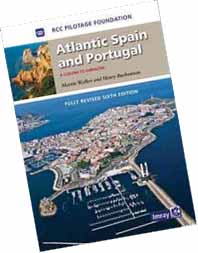 Atlantic Spain & Portugal pilot
Atlantic Spain & Portugal pilotInterested in Sailing the Atlantic Coasts of Spain and Portugal?
If so, then you really do need this pilot; I certainly wouldn't want to tackle this demanding coastline without it. It's the updated and improved edition of the one that we used when cruising this fabulous coast on Alacazam.
This pilot is the essential companion for sailboat skippers making passage south from the UK, for either the Mediterranean or onward to the Canaries before an Atlantic crossing.
Tuesday 31st July 2001
The morning brings rain but not for long and the sun is soon shining again. After breakfast we slip easily into boat chores as our intention (and we do try our best), is to keep Alacazam reasonably tidy. We had wanted to go ashore early but it is noon by the time we realise that each time one of us completes a specific task, if the other one is still working, we start another task.
We stop working and row ashore to find the Internet Café and also a local indoor market (San Augustin) mentioned in the Pilot book. We think we are following the map quite well but a few wrong turns later we have to enlist the help of a local to find our way. He is very friendly and helpful and walks with us until we have found the café (not really a café, no food or drink here). We study the map more closely and find a quicker way back to the main Plaza de Maria Pita (we never did find out who she was although a statue in the Plaza depicts her with a sword in her hand and a Roman soldier lying dead at her feet).
We have at last found the three main streets leading back to the Plaza, which are more geared to tourists and slightly more expensive. One road consists purely of restaurants and bars and the aromas emanating from here are delectable. We see langoustines, octopus and fish of all kinds but we feel it is more than we want to eat at this time.
We head back to the Plaza, which is surrounded by bars and restaurants and find a discreet little bar tucked away in the corner for a beer and a mineral water. Again we are offered food, this time a choice between tortilla and chorizo sausage with bread and olives. This is enough to keep us going and we do not need or indeed want anything more to eat. I do try the coffee though because Spanish coffee is always so good. The coffee beans are freshly ground as required and the aroma is wonderful.
We leave the Plaza by another small road and find the San Augustin market in a square close by, but just as it is closing for siesta time. It is a large enclosed market selling all kinds of food produce including fruit and vegetables, meat, cheese and eggs. A mezzanine floor covering all sides of the market sells nothing but fish and we buy fresh sardines from a young woman who has a very cheeky grin. She explains that the market normally closes at around 1400 hours but that the fisher-folk do not leave until all the fish is sold (and most of it has been, so the fish is definitely fresh each day).
Back downstairs and I spy some really large very fresh lettuces. The lady selling them tells me they are organic, her English is good and Dick comments that she must have lived in England. He is correct; she had worked for about ten years in a large hotel at Torquay. She is happy to chat with us and tells us a lot about the area and the Rias. I notice a fruit that I have never seen in England. It looks like a flat green apple but with a skin like a peach and I ask her what they are. They are called Paraguayos and she cuts one up for us to taste; a cross between a peach and a nectarine and absolutely delicious so I have to buy some.
It was cooler this morning so Dick and I are wearing long trousers and therefore cannot resist having a look inside the swanky yacht club. The Doorman looks us up and down but we show our Royal Western Yacht Club Membership card and we are allowed in. This is an extremely classy place. We take a quick look around, the carpets are lush and the walls are wood panelled covered with wonderful paintings. The furniture is old and large and clearly expensive and the dining room is exquisite. It is a beautiful yacht club but unlike the Royal Western back home in Plymouth, it is not really a working yacht club - more somewhere for the rich and beautiful people to be seen in. Definitely not for the likes of us then...
Back to Alacazam and Dick cleans the sardines and griddles them to perfection whilst I prepare a mixed salad with white asparagus; a simple meal but fit for Kings. Dick cooks fish so much better than me and he actually enjoys doing it.
At 1930 hours we head back to the 'Plaza de Maria Pita'. I want to find a ferret shop but we get lost again in the maze of little streets and cannot find one. We find ourselves back on the front main street again and notice that the craft fair is still open. There are 50 individual covered stalls selling quality goods such as jewellery, ceramics, paintings, leather ware, unusual knick-knacks and designer clothing. Some items are quite unlike anything I have seen before and I am fascinated (Dick is very patient). We turn a corner and there are more stalls selling food and drinks, one stall solely selling octopus, and small children are showing off and dancing on a raised stage. The atmosphere is buzzing.
Back to the Plaza and we can hear singing. Earlier, we had noticed a large scaffold stage in the corner of the square with rows of seats set out in front of it; now the seats are full and a male choir is singing on the stage. Eric and Jan have been watching for us and join us and we stand and listen for a while to another mixed choir who have replaced the male singers. By now the Plaza is floodlit and it looks and sounds fantastic. The buildings here are quite stunning and the people living in them have opened their windows or are sitting on balconies listening to the music. Entrances leading below ground in each corner of the Plaza, which we think are underground toilets (as in London), actually lead to a large car park. Because of its discreetness we are completely taken aback as we were totally unaware of its presence.
This is so different to the Mediterranean Spain that I remember. It is classier, unspoilt, very vibrant and alive.
We take Eric and Jan to the little bar in the corner and the lady who owns the bar remembers us and is really friendly. We discover that this week is the festival (fiesta) for Maria Pita and there will be different choirs singing here every night. The four of us are chatting away and we realise that we are the only people left and the bar is closing around us, but we are told not to hurry, it is not a problem. Shades of out local pub back home in Plymouth - the Royal Albert Bridge Inn, aka the RABI!
We bid everyone goodnight and return to the marina to row back to Alacazam. The marina is alive with fish from very large to very small. They are everywhere and so close to the surface that Dick is sure he can catch one with his hands. Before I know it he is lying flat on his belly hanging over the side of the pontoon and almost succeeds in catching one. The fish are too slippery though and he cannot grip them.
This is fun and we are in fits of laughter but the smiles freeze on our faces when we return to Alacazam. The tide is high, the wind is freshening considerably and the little boat next to us is much too close. Although there is no damage to Alacazam we think we must have hit because we note that the bow light is damaged on the other yacht and we had not noticed that before. We boat watch for a while and put out all our fenders as protection. There is nothing more we can do tonight and so we go to bed. I wake up a few times in the night and although the other yacht is literally inches away at times, we do not touch.
Wednesday 01 August 2001
We are both up early this morning to tidy Alacazam as Eric and Jan are coming to visit at 0900 hours. I make the tea and coffee as Dick rows the dinghy to the pontoon to pick them up. Alacazam is so different to Kuramu that I am not sure if they will like her but they are really impressed with her.
Jan is a good seamstress and we are soon engrossed, looking at the Reed's Sailmaker sewing machine, materials and sewing books that I have on board and discussing the merits and disadvantages of various materials for use in a boating environment.
Dick and Eric are ensconced in the pros and cons of modern electronics. The time passes quickly and after taking a few photos as souvenirs Dick rows them back to the pontoon. They are setting off from La Coruña at about 1200 hours, once again bound for Gibraltar. I feel sure we will meet them again somewhere soon.
Later we go ashore to buy some new pre-stretched rope for 'Arry', the Aries windvane self-steering gear. Dick had been given directions earlier by one of the attendants at the marina and although a fair distance it does not look too far on the map. Wrong, we walk for an hour before we reach the area and are somewhat surprised to find a cluster of very good chandlery's so far from the marina.
Prior to this, just after having left the marina and walking along the promenade by the rocks, we see a man holding one of the kittens and nosy me, being naturally inquisitive where cats are concerned, ask him if he intends to keep it. He speaks good English and explains that this is a domestic kitten, which he believes, someone has just dumped there from a car and the other feral cats were attacking it. There is a new family of kittens further along and he is going to introduce the kitten to them in the hope that it will be accepted into the family.
We walk with him and watch; the feral cats know him well as he brings food for them every day and although they ignore the kitten for a while they do not attack it. He thinks it will be accepted. It is a gorgeous kitten and I have to resist a great urge not to take it for myself. If I lived in La Coruña I am sure I would have done and I have a sneaking suspicion that Dick would have been ahead of me.
I digress; we buy the rope from the chandler and then consult the map again as to where to go next. La Coruña is much larger than we had realised and although we note an area of parks and gardens with monuments (one of which we can see in the distance) that no doubt would be worth visiting, our legs are feeling tired and we still have a long walk ahead of us to get back.
Since arriving at La Coruña we have been noticing a tram that seems to travel backwards and forwards around the peninsular and one terminus is quite close to the Marina. We check the map again and see that the other terminus is by the beach that we visited yesterday. It is still quite a walk to the beach but the tourist in me wants to ride on the tram and Dick capitulates as he thinks it could be fun.
So as not to get lost yet again, we pick a direct route to the beach and find we are in the department store area of town with very large shops. We could be anywhere in the world here and we much prefer the peninsular and the narrow winding streets with its quaint shops. We walk along the beach and stop to have a closer look at the statue of the surfers and when I look back I see that we have walked straight past the tram waiting at the terminus.
We run back and we are in time to catch it only to be held up as soon as the tram moves off by a car stopped on the tramlines waiting to back into a car space. The car already in the space cannot move out because the tram is in the way. An impasse ensues for at least five minutes with much arm waving until the car driver eventually capitulates and moves forward off the tramlines.
The tram driver has sat quietly throughout this and has just waited until he can continue, obviously a normal occupational hazard. We enjoy the tram ride and the views it affords and the welcome respite for our legs and feet, all for the cost of 125 pesetas each (less than 50p).
Dusk is falling and we wander back to the main Plaza and a drink in a little bar off the main drag. It is not a very friendly place so we leave and go back to the square where we stand and listen for a while to two more choirs, the singing is first class, before heading back to the marina (via the rocks for another look at the cats) to the yacht club for coffee.
There are two yacht clubs at this marina that share the pontoons and berths. As we have yet to find the Real Nautico Yacht Club office open we have not paid our mooring fees nor do we actually know which Club's mooring we are on because all the mooring buoys are red. We decide to have coffee at the Sporting Club Casino and find it quite pleasant.
A Swedish couple sitting at the next table invite themselves to join us at our table and tell us that they are planning to sail to the Caribbean with the ARC (the Atlantic Rally for Cruisers). Back to the dinghy and Alacazam. We have taken to tying up the dinghy on the end of the middle pontoon (known as the shaky pontoon for clearly obvious reasons) as it is a much shorter distance to row from Alacazam than where we had previously been tying up.
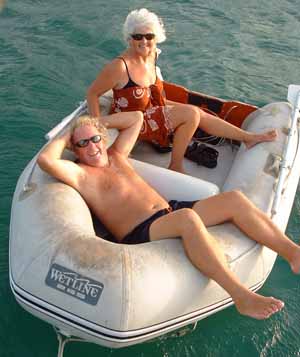 Us!
Us!I mention this now in hindsight because Dick has reminded me that I have not written about the hours of laughter I am imparting to him by my very strange antics on leaving and entering the dinghy.
The dinghy tubes have a large diameter and at first I needed to stand on them to get out of the dinghy only to find the dinghy moving away leaving me scrabbling on my hands and knees on the pontoon.
Getting in was even better, a large step over the tube into the dinghy invariably had me falling over the inflatable seat with my bum stuck up in the air in a very undignified manner or else sitting on my bum in the bottom of the dinghy with my legs in the air, equally as undignified.
Getting on and off the transom on Alacazam was just as fraught. My technique though is improving daily and I will soon have the appearance of someone who knows what they are doing. I have to say in my defence that Dick too has his moments. A particular time comes to mind when he pushed away from the pontoon so hard that when he stepped into the dinghy he nearly catapulted himself straight over the other side and would have gone for a swim if I had not caught him in time.
Also when he is rowing he seems to need the whole of the dinghy space and I find myself tucked in the aft corner sitting on the wing and twice, when trying to miss his arms and feet, I have nearly tumbled in the water myself. I wonder who is going to get the first, inevitable, ducking.
Earlier when we were approaching the pontoon to leave the dinghy, we were jockeying for position with another dinghy transporting a very attractive young Dutch couple. We managed to tie up and all scrambled for the pontoon and we laughed and chatted for a while. They had noticed us on Alacazam and said how much they admired her. They too are travelling south to cross to the Caribbean and are hoping to reach Cuba and as the children in Cuba have so few toys, they had bought loads of toys in Spain to give to them.
Suddenly I notice through the saloon window, a mast of a boat that looks very close. I call Dick and we rush up on deck and find that our dinghy has got itself caught up in the small yacht's mooring rope and we are now facing the wrong way and are about to collide not only with the small yacht on our starboard side but also with another much larger yacht on our port side. We disentangle the dinghy and hold off both yachts while we swing back with the tide, managing to avert yet another small crisis.
I am wide-awake by now and then I stay up until 0200 hours writing this journal. I am sure that as time goes on I will write less but, just now, everything is so new and different and I want to record everything. I'm finding it very time consuming though.
Thursday 2nd August 2001
This morning we wake up to rain and fog and find ourselves entangled yet again with the small yacht. Dick spots a free mooring but before we can move we are beaten to it by another yacht that has just entered the harbour. Moments later, through the heads port, I see a trimaran yacht leaving its mooring and yell for Dick to make haste and we are quick enough to pick it up; this time Dick on the helm with me doing the picking up, (we are getting quite expert at leaving and picking up moorings). We now have more room around us and we have previously noticed bigger boats than Alacazam moored quite safely on this mooring.
It is nearly siesta time so we stop and have a fruit lunch and then carry out a few boat chores (cleaning the cooker etc.) until it is time for the shops to open at 1700 hours. First stop the Marina offices to pay our fees. At last there is someone in the Nautico Real office but we are directed to the offices of the Sporting Club Casino as we are moored on their mooring (so all this time we have been using the facilities of the wrong club).
The Marinero at the Sporting Club Casino is sympathetic when we tell him the problems we have been experiencing with the moorings and for a cash deal does not charge us for one of the nights. Next stop the fuel barge where we fill a five-gallon tank with fuel, which we leave in the dinghy (this time tied up near the fuel pontoon as the tank is heavy to carry too far.
We ask if there is a launderette nearby and the owner of the bar directs us to one reasonably close by only to find when we get there that is a laundry (the same Spanish word for both) and cannot be done until tomorrow. We decide to forget about the laundry and concentrate on stocking up with groceries at a nearby supermarket. On the way to the laundry we had passed some interesting cafes and bars and return to one of them to eat.
This is very much a local's café and the owner shows us the various dishes she is cooking. We choose a local stew consisting of beans, cabbage, potato and chorizo sausage and really enjoy it, it is so tasty. While we were waiting for the stew she gave us a dish of peanuts to eat with our wine; six glasses of wine, two bowls of stew, a basket of bread and the peanuts. And the cost? Only £6.
At the yacht club we meet an interesting elderly couple; an American (male) married to a Finn who are sailing a brand new Sweden 39 ft yacht, bought in Sweden, back to their home in Florida. They had caught the bad weather in Biscay, having just arrived in La Coruña, but the yacht had handled it well, although their electronic auto-helm had been troublesome.
Although we have loved it here it is time to leave La Coruña; we are both getting restless and want to get around Finisterre and head further south to the Rias Bajas as soon as possible.
Next: South to the Rias Bajas
Recent Articles
-
Parachute Sea Anchor Issues: Your Questions Answered
Mar 27, 25 01:52 PM
Parachute sea anchors are vital for stabilizing sailboats in heavy weather, but they can be difficult to deploy. Here we take a look at common issues and their solutions. -
Sailing Drogue Issues: Your Questions Answered
Mar 27, 25 12:52 PM
Stay safe in heavy seas! Learn how sailboat drogues can control speed, prevent pitchpoling, and make storm survival manageable for offshore sailors. -
Solar Panel FAQ's
Mar 27, 25 05:16 AM
Got a question about marine solar panels? You'll probably find the answer here...
